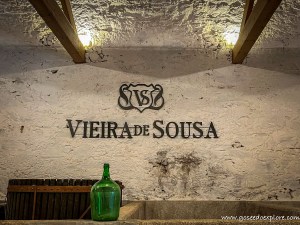
The view from Quinto do Jalloto
Some of the links below are affiliate links and as such, I earn a small commission from purchases that allow me to continue telling you my stories without costing you anything extra.
One thing I knew I wanted to do with our time in Porto was a tour of the Douro Valley. We chose a tour with Oporto Tours which picked us up near our Airbnb and took us on a tour to really get to know the Douro region, its history, and what makes their wines unique. Our guide, Tiago, expertly navigated the steep, twisty roads of the Douro while telling us all about the region.
The Douro Valley is a World Heritage Site and is the oldest demarcated wine region in the world. People have been expertly growing grapes in terraced vineyards for generations. Many of them are still harvested by hand with the grapes being stomped by feet. The annual grape stomping has become a tourist attraction at many Quintas with stomping having to be booked months in advance.
 The first stop on our tour was at Viera de Sousa, a 5th-generation family-owned and operated winery, growing grapes on 4 quintas in the Douro Valley. The current generation running the winery are women which is uncommon in Portugal. Here we learned a lot about the difference in Portuguese wines. Traditional Port is a sweet, fortified wine made of a blend of grapes (common Port Wine grapes include Touriga Nacional, Tinta Roriz (AKA Tempranillo), and at least 50 others). White port is typically more fruit-forward and less sweet than other port varieties. Tawny Port is aged at least 2 years in barrels before going into the bottle and typically has flavors of caramel and nut on top of the fruit flavors. Ruby Port is fruit-forward, sweet, and meant to be drunk young. After the wine ages in a barrel for two years, a sample can be sent off to the Institute of Douro and Porto Wine for an assessment, and if a wine is of high enough quality it can be declared for a Vintage where it will be aged in bottles for at least 15 more years. Therefore, Vintage Port is the most expensive and distinguished wine of the Douro Valley. At Viera de Sousa we sampled some of their still wines as well as a white port (which I had never had before), a Tawny, and a Ruby. Their wines were wonderful and their ports were very different than the mass-market port we have in the U.S.
The first stop on our tour was at Viera de Sousa, a 5th-generation family-owned and operated winery, growing grapes on 4 quintas in the Douro Valley. The current generation running the winery are women which is uncommon in Portugal. Here we learned a lot about the difference in Portuguese wines. Traditional Port is a sweet, fortified wine made of a blend of grapes (common Port Wine grapes include Touriga Nacional, Tinta Roriz (AKA Tempranillo), and at least 50 others). White port is typically more fruit-forward and less sweet than other port varieties. Tawny Port is aged at least 2 years in barrels before going into the bottle and typically has flavors of caramel and nut on top of the fruit flavors. Ruby Port is fruit-forward, sweet, and meant to be drunk young. After the wine ages in a barrel for two years, a sample can be sent off to the Institute of Douro and Porto Wine for an assessment, and if a wine is of high enough quality it can be declared for a Vintage where it will be aged in bottles for at least 15 more years. Therefore, Vintage Port is the most expensive and distinguished wine of the Douro Valley. At Viera de Sousa we sampled some of their still wines as well as a white port (which I had never had before), a Tawny, and a Ruby. Their wines were wonderful and their ports were very different than the mass-market port we have in the U.S.

After our first wine tasting, we headed to Pinhao to board a typical rabelo boat (right) for a tour of the Douro River. These boats were used in the past to get the wine from the vineyards along the Douro to the Port Wine houses in Ville Nova de Gaia. Before the installation of dams along the river, the Douro was treacherous many small chapels were built along the riverbank to protect the sailors from the river’s wrath. Nowadays with other ways for the wine to reach Porto, the rabelo boats are purely for tourists. I was really excited about our boat ride and while the views were amazing, the boat itself was crowded with groups from other tours. Since the tour, people have asked if I would recommend a ride on a rabelo as part of a tour of the Douro and I am really torn, because while it wasn’t the highlight of my day in the Douro, I think I would have regretted it if I saw the boats and I didn’t get to go on it. That is probably the least helpful advice I have ever given on this blog, but it is the only way to describe how I feel. It is possible to ride a rabelo in Porto for a tour of the 6 bridges that is only $16 for 50 minutes on Viator.

After our boat ride, we had a great Portuguese lunch in Pinhão. with a choice of beef or fish. After lunch, our tour guide Tiago took to us the Pinhão train station to see the beautiful Azulejos depicting early life in the Douro (above).

From there, we made our way to our final stop of the tour at Quinto do Jalloto (above) in Casal de Loivos. Besides, wonderful wine this quinta had the most breathtaking views of the “sharks” across the river (AKA the Dow’s estate, top). We learned that just like in Mexico, grapes and olives grow together in the Douro and their olive oil was amazing! Here we sampled three still wines, honey, and the delicious olive oil. The wine here was very unique and not like anything I had ever had back home.
Our tour concluded with the beautifully scenic drive back to Porto. If you have plans to visit Porto, definitely take some time to explore the Douro. It is an amazing place unlike anywhere else I have ever been. I can’t say enough good things about our tour from Oporto Tours. Our tour was pricey but absolutely worth it.
Thanks for stopping by! Be sure to check back next week when we take a free tour of Porto! To read more about this trip, check out Cruising the Atlantic to Portugal and Spain trip report. To read about some of our previous trips, visit my Trips Page. If you like my photos be sure to “like” my Facebook Page and follow me on Instagram! For my list of gadgets to make your travels easier, click here. To see inside my camera bag, check out my updated Gear Page.

Leave a Reply